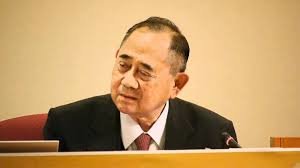A Proposal for a joint mission to North Korea

TEHRAN, Nov. 4 - - Former Philippine Speaker Jose de Venecia, the Philippines' Special Envoy for APEC and Inter-Cultural Dialogue, proposed today a "small composite team of APEC and ASEAN" to journey to Pyongyang to begin to negotiate "a peace that will hopefully endure in the Korean Peninsula."
He said the 21-member Asia Pacific Economic Cooperation (APEC) and the 10-member Association of Southeast Asian Nations (ASEAN) are meeting one after the other, back-to-back, in Vietnam (November 8-11) and in the Philippines (November 10-14) for their annual Leaders Meetings. He added their leaders could quietly explore in the next two weeks the idea of sending a joint peace mission to the North Korean capital.
He pointed out Philippine President Rodrigo Duterte hopes a new tack could ease the continuous exchange of accusations in the Peninsula and lead to opportunities for the difficult peace.
De Venecia said he envisioned inter-Korean talks could be at senior or mid-levels, representing perhaps not more than seven parties including key APEC members. US., China, Russia, Japan, South Korea, a representative of ASEAN, and North Korea; progress could be "publicized or unpublicized" with a recess on the eve of the Christmas holidays, and the talks could target preliminary understanding by early next year.
He pointed out there should be a timetable otherwise the talks could be endless as in the old Panmunjom talks. However, while the 1950-1953 South-North Korean conflict ended, "a technical state of war persists until now, with both sides not signing a formal peace treaty," he said. Today there is continuous, recurrent threat of hostilities, even nuclear war, since North Korea has already developed nuclear weapons with a missile delivery system.
De Venecia said he hoped a meeting of the two Koreas, with nominees from APEC and ASEAN in attendance, could lead to an "eventual peaceful ASEAN Plus 4 configuration." This would add North Korea (the Democratic People's Republic of Korea) to the current ASEAN Plus 3, which includes the 10 ASEAN nations plus China, Japan, and South Korea until at some point, in the future, perhaps the two Koreas could consider a "unification" or "confederation."
De Venecia pointed out as a first stage 'Confederation" is easier to promote, ahead of eventual unification.
De Venecia, who is founding Chairman of the International Conference of Asian Political Parties (ICAPP), counts North Korea's Korean Workers Party as one of ICAPP's more than 300 ruling, opposition and independent parties as members. Also, as Co-Chairman of the International Association of Parliamentarians for Peace (IAPP), he also plans to invite the North Korean Parliament to nominate delegates to the IAPP.
Looking back at recent history, de Venecia said for decades since the 1950s observers said the two Germanies and the two Vietnams could never unite but unforeseen, unnegotiated geo-political circumstances eventually proved everyone wrong, resulting finally today in a strong, prosperous united Germany and a flourishing united Vietnam.
As then head of the Philippine Congress' foreign relations committee, he journeyed to Pyongyang in 1990 and with North Korea's founder then President Kim Il-Sung, grandfather of current leader Kim Jong-Un, finalized North Korean-Philippine diplomatic relations and dispelled as well North Korea's rumored assistance to the Philippine New People's Army.
At the time, in Kim II Sung's mountain retreat, de Venecia pointedly asked the North Korean leader if there was truth to speculations that he planned to attack South Korea, he replied: "If we attack the South, the South will be destroyed. But we in the North will also be destroyed."
After a few weeks, on de Venecia's invitation, North Korean Deputy Premier Kim DahlHyun flew to Manila to finalize agreement on formal diplomatic relations with then Philippine President Corazon Aquino's Foreign Secretary Raul Manglapus. After about a year, Japan's LDP leader Kanemaru journeyed to Pyongyang, followed later by then former U.S. President Jimmy Carter.
De Venecia said he hopes ICAPP and lAPP could contribute even modest efforts to a North-South inter-Korean peace process.He disclosed one of the founders of IAPP and the Universal Peace Federation (UPF), Madame Hak Ja Han Moon and her late husband Dr. Sun Myung Moon, donated a much-appreciated hotel and automobile factory in Pyongyang to the North Korean government. He added a small team of IAPP headed by former Nepal Premier Madhav Nepal and former Minister of Peace and Reconstruction Ek Nath Dakhal recently visited Pyongyang and had constructive talks with the North Korean Workers Party.
De Venecia has asked UPF President Thomas Walsh, IAPP Co-Chairman Dan Burton, Washington Times Publisher Thomas McDevitt, and Ambassador Joseph de Trani, former U.S. Envoy to the Six-Nation Party Talks on North Korea, to organize a peace mission to Pyongyang, which he earlier discovered with UPF President Walsh.
Leave a Comment